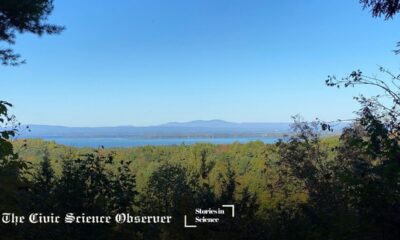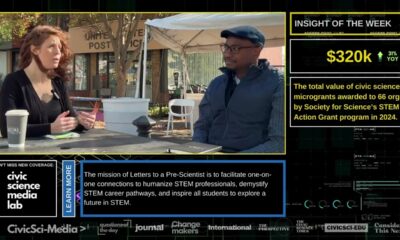Stories in Science Special Series
An Immunologist’s Perspective
Dr. Viki Male started her scientific career as a PhD student at the University of Cambridge, where she worked on the development of NK cells in the human uterus before moving to Imperial College London to find out how NK cells develop in mouse bone marrow. After spending a year at home with her baby son, she moved to UCL to start her own research group, which focuses on the development and function of NK cells in the liver.

Viki Male
[su_boxbox title=”About”]Dr. Viki Male started her scientific career as a PhD student at the University of Cambridge, where she worked on the development of NK cells in the human uterus before moving to Imperial College London to find out how NK cells develop in mouse bone marrow. After spending a year at home with her baby son, she moved to UCL to start her own research group, which focuses on the development and function of NK cells in the liver. The story below was originally published on November 12, 2017 on The Female Scientist. You can follow Viki on Twitter [/su_boxbox]
How did you get into science?
When I was a kid, I used to get up early on Saturday mornings and watch TV. There was a programme which explained how the body worked by representing all the different cells as characters. Bacteria and viruses were the main “baddies” and the immune cells were the heroes. It was my favourite part of the whole week.
That’s how it started, but I was also encouraged a lot by my dad. He’s a professional scientist, but he also has a real knack for doing science with whatever comes to hand. One time we discovered that the leaves from a pot plant of my mum’s could be used to make quite a good indicator. We took a lot of leaves, the plant didn’t do well and my mum was unimpressed! Still, I guess it sparked something in me because I always thought I would feel at home working in a lab, and it turns out that I do.
Which topic are you working on at the moment? Why did you choose this topic and how do you think it will make a difference?
When I was at school and later at university, I was really interested in viruses. I like how they can do so much with so little of their own by hijacking the cell’s resources. Natural Killer (NK) cells are immune cells that recognise and kill virally infected cells, and they have a really clever way of doing it. Almost all the body’s cells have a protein called MHC, which shows a sample of what the cell is making to what are probably the most famous immune cells, the T cells. This way, the T cells can see if a cell is infected with a virus and kill it. But lots of viruses try to get around this by stopping the cell from making MHC, so the T cells can’t see what’s going on inside. NK cells act as a riposte to this kind of dirty dealing by viruses, because they kill any cell that refuses to show its MHC. When I learnt about this, I was enchanted by its elegance and I have been studying NK cells ever since.

Dr. Viki Male
Quite recently, it turned out that there is a special kind of NK cell that is only found in the liver, and my group showed that these special NK cells can’t ever leave the liver – they are liver-resident. The thing is, we still don’t know what they do. There is some evidence that they could act as an early warning system for certain viruses that particularly infect the liver, but I think they might also do something important in the healthy liver. “Good” bacteria are a normal part of the healthy gut, and we’re looking at the idea that these special NK cells might respond to bacterial products that are carried from the gut to the liver in the blood. Whatever it is they do, I think it will be important since these special NK cells are the most numerous immune cells in the healthy liver.
What were the biggest obstacles you had to overcome as a woman scientist?
There are a lot of obstacles for women scientists. I know from working with A-level students that some young women feel that they can’t do science because it’s “not for girls”. I sometimes see that lack of confidence even in women who have made it as scientists. And I have colleagues who feel they have been treated as lesser because they are women, and even some who have been treated as sex objects.
For me personally, though, the biggest obstacle came when I had my son. Scientists often work on fixed-term projects and have to move labs every couple of years, and that was the position I was in when I was pregnant for the first time. My boss expected that the funding for the project would be renewed, but it wasn’t and I lost my job two days before my son was born. I started looking for another job when he was about 12 weeks old and spent almost a year sending off job applications. It was tough because even though I felt I was a strong candidate, I got very few interviews and, when I was called to interview, wasn’t offered the job.
I nearly left science then, just so that I could have a job and pay the rent. But the desperation of that time also pushed me to apply for things that I felt unqualified for. That’s how – encouraged by a senior woman scientist at my current university – I came to apply for my Sir Henry Dale Fellowship. That application was funded, and it allowed me to start my own lab.
You’ve got two children now. How do you balance career and family life?
The short answer is by having a lot of support! My husband used to work very long hours so I would take care of both the drop off and pick up at the childminder, which really ate into my working hours. Recently, he’s taken a role with a more family-friendly company, and he now only works four days a week. That’s helped immensely, although I still work shorter hours than I did before having children. I manage by prioritizing my time quite carefully.
I’m also very lucky in that my Fellowship pays for me to have a research assistant. She’s a brilliant scientist and having two of us on the project means that we can tag-team long experiments. The Wellcome Trust, who funds me, is also really great about supporting scientists as they come back from parental leave. I came back from maternity leave after having my second child in the summer and the additional research support they’ve offered me as I’ve returned has been invaluable.
What changes do you think are needed to make science more attractive to women?
In my field, lots of women start at the bottom, doing PhDs and post-docs. It’s as you start to look at more senior positions that you see fewer women scientists. I think our system of short contracts does play a role in this, since it disadvantages those who take time out of science for family or other reasons – and that’s usually women.
It’s hard to see how anything can be done about that within the current funding system, but perhaps having more ways to get back into science after a break would help. Now that we have shared parental leave, another part of the solution will be to encourage fathers to take their share of parental leave too. That will put mothers at less of a disadvantage compared to fathers, although there will still be a problem for parents in general. It’s definitely a knotty problem.
I think we shouldn’t forget, though, that there are other groups who are even less represented in science than women. Race, class and sexuality are all things we should be talking and thinking about. I used not to be comfortable talking about my experience as a woman in science, or asking my colleagues what barriers they face – it seemed rude, somehow. But I’ve come to realise that pretending that these things aren’t issues isn’t making them go away, and that talking about discrimination isn’t the same as discrimination. We have to do these things in order to fully define the problem. And if we don’t understand the problem, how can we come up with a solution?
Read more about Viki Male Here: Life story: Viki Male
Metrics
Sessions
Total number of Sessions. A session is the period time a user is actively engaged with the page.
Visitors
Users that have had at least one session within the selected date range. Includes both new and returning users.
Page views
Pageviews is the total number of time the article was viewed. Repeated views are counted.
The CS Media Lab is a Boston-anchored civic science news collective with local, national and global coverage on TV, digital print, and radio through CivicSciTV, CivicSciTimes, and CivicSciRadio. Programs include Questions of the Day, Changemakers, QuickTake, Consider This Next, Stories in Science, Sai Resident Collective and more.

-
Audio Studio1 month ago
“Reading it opened up a whole new world.” Kim Steele on building her company ‘Documentaries Don’t Work’
-
 Civic Science Observer1 week ago
Civic Science Observer1 week ago‘Science policy’ Google searches spiked in 2025. What does that mean?
-
Civic Science Observer1 month ago
Our developing civic science photojournalism experiment: Photos from 2025
-
Civic Science Observer1 month ago
Together again: Day 1 of the 2025 ASTC conference in black and white
Contact
Menu
Designed with WordPress
























